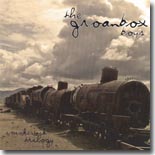 The Groanbox Boys play a highly original mixture of American
music styles including blues, rag, and folk, using an unusual array of
instruments ranging from accordion, banjo, harmonica, piano, and various
percussive items. Their music takes as its source the various and
diverse styles of music used in the pre-war years. Back in those days,
it was not surprising to hear whites from different parts of the country
play the blues, and blacks, particularly from the South, to play country
music. It was the fact that so many different people from different
cultures played these styles that caused them to continue to grow and
develop, and also to absorb aspects of each other in the process.
The Groanbox Boys play a highly original mixture of American
music styles including blues, rag, and folk, using an unusual array of
instruments ranging from accordion, banjo, harmonica, piano, and various
percussive items. Their music takes as its source the various and
diverse styles of music used in the pre-war years. Back in those days,
it was not surprising to hear whites from different parts of the country
play the blues, and blacks, particularly from the South, to play country
music. It was the fact that so many different people from different
cultures played these styles that caused them to continue to grow and
develop, and also to absorb aspects of each other in the process.
The Groanbox Boys' recent release, Smokestack Trilogy (Groanbox
Records), is a wonderful trip through American music, taking music from
60 and 70 years ago and putting a modern sheen to it. The band consists
of two musicians, Connecticut native Cory Seznec, who plays banjo,
harmonica, and guitar, and New Yorker Michael Ward-Bergeman, who plays
accordion and piano. Both members sing and collaborated on the songs
(the lone cover is the Delmore Brothers' "I'm Mississippi Bound").
As might be expected, Smokestack Trilogy consists of three
suites. The first suite kicks off with a rollicking "Train Take My Pain
Away" that will get your toe tapping for sure and features a blistering
harmonica spot by Seznec. "Sea Bone Howl" is a mellower tune that
showcases Ward-Bergeman's accordion.
"Hobo Heaven" is an aching, mournful track about broken dreams and
hopes, but the mood doesn't stay somber long as the following track, the
instrumental "Mount Pleasant Rooftop (AT DUSK)," features a spirited
banjo performance by Seznec. The suite closes with the lively "Harefield
Hospital Rag...." (The disc was recorded in a 1930s art deco concert
hall at Harefield Hospital in the UK, which is where the band is based).
The second suite opens with the bouncing country romp, "Lonesome
Traveller," followed by "Home Again," a country blues. "Juliette Red
Dress" is an instrumental featuring sparkling interplay between Seznec's
guitar and Ward-Bergeman's accordion. "Wham Bam" is a clever, salacious
piece about a man who has to "be in love before I make some love." The
suite closes with "Harefield Hospital Special....," a brief piano
number.
The concluding suite begins with the dark, meditative "Broken Down
Bolivian Blues." "Last Call" is a cheerful train song featuring banjo
and accordion that begins to wrap up the disc. "Bygone Era" is a
pleasant guitar instrumental, while the closing track is the cover of
the Delmore Brothers's "I'm Mississippi Bound," which features some nice
harmonizing by the duo. Closing out things is "Harefield Hospital
Lament...."
Throughout, the interplay between Ward-Bergman's accordion and Seznec's
banjo is superb. Smokestack Trilogy has something special to
offer fans of American Roots music. The Groanbox Boys touch on a variety
of styles with this release and the results are outstanding. This disc
can be purchased at www.cdbaby.com. For more information on the band,
visit their website (www.groanboxboys.com).
--- Graham Clarke
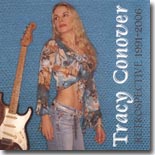 Tracy Conover made a few waves over the past couple of years with
her CD, Live At The Cactus Moon. A striking mix of rock, blues,
and R&B, one came away from that experience hungry for more of her
powerful guitar and soul-heavy vocals. Conover delivers more of the same
on her latest release, Retrospective 1991-2006 (Guardian Wolf
Music), a collection of sides the performer has recorded over the past
15 years.
Tracy Conover made a few waves over the past couple of years with
her CD, Live At The Cactus Moon. A striking mix of rock, blues,
and R&B, one came away from that experience hungry for more of her
powerful guitar and soul-heavy vocals. Conover delivers more of the same
on her latest release, Retrospective 1991-2006 (Guardian Wolf
Music), a collection of sides the performer has recorded over the past
15 years.
Conover started playing guitar in her mid-teens, but embraced the blues
while studying Voice, Jazz, and Classical Guitar at North Texas State
University in Denton, TX. She absorbed the music of artists like Freddie
King (whose “Goin’ Down” was a highlight of her live CD), T-Bone Walker,
Magic Sam, B.B. King, Albert King, Stevie Ray Vaughan, and Albert
Collins. She moved to Austin in 1991, starting her own band and playing
almost nightly. Later, she played with and toured with Earl King, Albert
Collins, and opened for a diverse group of musicians, including Dick
Dale, Buddy Guy, Charlie Daniels, the Marshall Tucker Band, and B. B.
King.
Retrospective features Conover in a lot of different settings,
featuring 15 tracks with some stellar musicians pitching in. Among them
are former Double Trouble rhythm section Chris Layton and Tommy Shannon,
Mark “Kaz” Kazanoff, Barry “Frosty” Smith (former drummer for Sly & the
Family Stone and Parliament), Larry Fulcher (bassist for Taj Mahal),
James Polk (former James Brown piano man), Tommy Taylor (drummer for
Eric Johnson), Riley Osborne, and Chris Duarte.
Not that Conover needs a lot of help. She is more than capable of
holding your attention with her guitar pyrotechnics on tracks like the
hectic opener, “Ironhorse,” or the slow burners, “Escape” and “Ladykiller,”
or the rock & roller “Bye Bye Baby.” However, there are a handful of
R&B-based tracks, like “Help Me Through The Day,” “There For Me,” “Tell
Me,” and “Carelessly,” where Conover’s vocal gifts are front and center.
As skilled as she is on the guitar, her singing lifts her above the
competition. She’s as comfortable tackling a bluesy number like “My Big
Rocker” as she is a tender ballad like “I Wanna Be An Angel.”
At home singing and playing the blues, R&B, or rock, Tracy Conover shows
with Retrospective 1991-2006 that she’s worthy of more attention.
This CD can be found at
www.cdbaby.com.
--- Graham Clarke
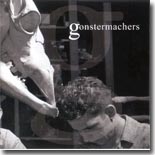 The gonstermachers took their moniker from the Yiddish word,
Gantseh Macher, which means “Big Shot.” With a name like that, plus
their inclination to play instruments like the block flute, tambour,
ukulele, and cello along with the usual blues-related instruments, not
to mention their occasionally offbeat compositions with lyrics that
refer to relics of the past, (one of which, Cazzie Russell, was one of
my favorite old-school NBA hoopsters), you have to figure that these
guys better be good, right?
The gonstermachers took their moniker from the Yiddish word,
Gantseh Macher, which means “Big Shot.” With a name like that, plus
their inclination to play instruments like the block flute, tambour,
ukulele, and cello along with the usual blues-related instruments, not
to mention their occasionally offbeat compositions with lyrics that
refer to relics of the past, (one of which, Cazzie Russell, was one of
my favorite old-school NBA hoopsters), you have to figure that these
guys better be good, right?
The gonstermachers are good, and their self-titled debut release is
sometimes hard to classify. It’s not just blues, or roots music, or
rock, or even Americana. It’s all those styles, rolled into one. Just
call it a musical goulash, an eclectic mixture of genres. You might not
know what went into it, but you know it’s tasty. The quartet is based in
Syracuse and consists of Leo Crandall (cello, guitar, ukulele, vocals),
Curtis Waterman (harmonica, percussion, block flute, vocals), Hymie
Witthoft (drums, tambour, gongs, vocals), and Richard Curry (washtub
bass, percussion, vocals).
There are ten tracks on the disc, seven of which were composed by the
band. The opening cut, “the night sam cooke died” can best be described
as a surreal dirge, while the poet Michael Burkard wrote the unusual “my
sister she’s not a dollar.” “danse les macher,” is a blues instrument
featuring Crandall’s guitar and Waterman’s harmonica, and “cool down
there” is a lively number that will get you on your feet.
“left handed man” is a moody Delta blues number that would have been
better if the vocal hadn’t been done through the harp mike, and “lowdown
on the blowdown” is another energetic instrumental with more great
harmonica. “danse les negres” is one of two covers on the disc and it
gets a funky reworking by the band.
“saint sebastian” is a mournful ballad which features a ukulele solo by
Crandall along with Waterman’s block flute, and
“gasstationchickendinnerromance” is a great tune about just grabbing
your girl and letting it all hang out. The disc closes out with a nearly
ten-minute cover of “st. james infirmary,” another reworking that gets a
thoroughly modern makeover.
Crandall does most of the singing and has an expressive style and plays
some fine guitar, including some great slide work on “cool down there.”
Waterman is a standout on harmonica and Curry and Witthoft are a rock
solid rhythm section.
I can safely say that you’ve probably not heard anything like the
gonstermachers recently. In this world of homogenized, sterile musical
product, their sound is like a breath of fresh air. Breathe deeply; it’s
hard to come by these days. If you’re interested in something completely
different in the blues world, go to the bands website (www.gonstermachers.com)
and check them out.
--- Graham Clarke
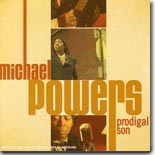 Michael Powers’ 2006 recording, Prodigal Son, has been nominated for
three
different awards from the Blues Foundation for 2007 – Contemporary Blues
Album Of The Year, Contemporary Blues- Male Artist of the year, and The
title track is up for song of the year. In my view these nominations are
richly deserved, as this is a superb album.
Michael Powers’ 2006 recording, Prodigal Son, has been nominated for
three
different awards from the Blues Foundation for 2007 – Contemporary Blues
Album Of The Year, Contemporary Blues- Male Artist of the year, and The
title track is up for song of the year. In my view these nominations are
richly deserved, as this is a superb album.
Prodigal Son is Powers’ second CD, the follow up to Onyx Root, which
was nominated for two awards in 2005.
The album is full of influences from the music that I guess Powers grew
up with --- Jimi Hendrix, Rolling Stones, Jimmy Reed (who,
apparently showed Michael Powers how to play his first guitar chord),
Bob Dylan, Muddy Waters, John Lee Hooker --- but this guy has enough
originality in his music that these influences don’t take over.
He is obviously a man who likes rocking blues, and he can perform it
with the best of them, but he is more than that, as the mix of styles
and tempos on this album ably demonstrate – just listen to his version
of Bob Dylan’s “Every Grain Of Sand.”
There are, in fact, so many changes in style and tempo on this CD that I
found it difficult to pinpoint Powers’ own style – that’s not a
criticism, it’s what makes this CD so refreshingly different.
So many artists produce a great CD but every track sound similar because
their own style is so strong that it dominates whatever they do – with
Michael Powers, every track is just so totally different from the last.
The songs included on the album are a mix of originals and covers, and
the opening track just happens to be a favourite of mine – the Don Nix
composition that was such a hit for Freddie King – “Going Down.” There
are tracks by Sonny Boy Williamson, Bob Dylan, Arthur Lee, Blind Gary
Davis & Tiny Bradshaw (via the Yardbirds & Johnny Burnette) – this will
give you an idea of the diverse mix of influences and styles that Powers
calls on for his music.
From the originals on the CD, I have to pick the title track as being my
favourite – although all of the originals stand up to scrutiny and all
are well written and well played.
“White Lightning” was apparently written by Powers way back in the
1970s, but it sounds fresh and alive and could well have been written
yesterday.
If I have to pick a favourite from the covers, it has to be between
“Goin’ Down” and “Train Kept A Rollin’, “ and I really don’t know which
to pick!
I really hope that this album picks up the awards that it’s been
nominated for, and that spurs Michael Powers into bringing out more
great CDs in the future – this man is a great talent without a doubt.
--- Terry Clear
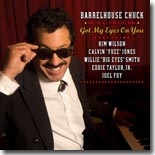 Barrelhouse Chuck came from Florida to assimilate his piano into
the Chicago blues community over the last 25 years. On this release,
Got My Eyes On You (The Sirens Records), the ghost of Otis Spann
jumps out of the speakers from note one, as does the rawness of the
classic electric Chicago blues sound. Also from the start, Kim Wilson’s
harmonica never discriminates among blues styles, and is also never
compromised.
Barrelhouse Chuck came from Florida to assimilate his piano into
the Chicago blues community over the last 25 years. On this release,
Got My Eyes On You (The Sirens Records), the ghost of Otis Spann
jumps out of the speakers from note one, as does the rawness of the
classic electric Chicago blues sound. Also from the start, Kim Wilson’s
harmonica never discriminates among blues styles, and is also never
compromised.
One has to really crack the cryptic coding to follow exact participants
from track to track, but if you’d rather freshen your drinks as the
album progresses, the program still packs a seamless punch for the most
part. For example, the first voice heard on the disc is on track two, a
verbal intro by Ella Evans, Detroit Jr.’s companion, who co-wrote the
tune in question, “Call My Job.” She expresses gratitude for Chuck
performing the tune in Detroit’s memory. The second voice heard is after
a few bars of the two-step intro when the leader imitates a female’s
falsetto! See what I mean?
Chuck’s vocals continue on “Got My Eyes On You,” an almost-perfect Sonny
Boy “Help Me,” nebulosity piqued by Chuck’s “acoustic piano and Farfisa.”
On most tracks Barrelhouse’s rhythm section includes Muddy Waters vets
Calvin “Fuzz” Jones playing bass and Willie “Big Eyes” Smith on drums.
Acknowledgement must, however, go to Frank Bandy’s bass and Smith’s
drumming son Kenny who replaced the rhythm track parts on a couple
numbers for some reason. It is due to Bandy that Blues Bytes and
“The Sirens” record label were introduced. (Mr. Bandy has been an active
blues bassist in Chicago for some years now, toured with Jimmy Rogers,
runs his own “Teardrop” label, and often backs J. B. Ritchie).
Suffice it to say, Barrelhouse Chuck’s musical style is pretty much
modeled after personal mentors Sunnyland Slim and the lesser-known
Little Brother Montgomery. It is suggested that Chuck’s piano is
reminiscent of the former, but his higher pitched vocals remind us of
the latter.
It’s definitely a Sunnyland slant on Memphis Slim’s “Mother Earth.”
Eddie Taylor Jr. plays both bass and guitar, while Kim Wilson and the
leader achieve impressive vocal harmony. Then, scrambling personnel
again without missing a beat, the leader completely lays out during a
funky instrumental much like the old Jr. Wells/Buddy Guy “Snatch It
Back.” The Muddy Waters group template, with Chuck’s vocal instead,
permeate the next two numbers, snapping with shuffle, then easing down
with Floyd Jones’ “School Days.” Otis Spann’s influence is again notable
on both.
There’s a Big Moose Walker number included, another of Chuck’s
influences. It’s in tribute to the Chicago keyboard man known for organ
work, and Chuck plays that instrument here sounding more like Eric
Burdon than the Bull Moose. Eddie Taylor, Jr. is again on guitar, Frank
Bandy and Kenny Smith again are the rhythm section, grooving tightly on
this lone organ entry of the album. Muddy’s “Just To Be With You” is as
heavily rhythmic as the original, Chuck’s vocals like early Bob Margolin,
and no piano. Eddie Taylor Jr.’s lead vocal sounds good on his dad’s
“Big Town Playboy,” Barrelhouse Chuck playing simpler piano here, maybe
like Pinetop Perkins.
The next instrumental, “Red River Rumba,” is just that, and is composer
and guitarist Joel Foy’s chance to shine. A couple vintage guitar amps
are described in the notes which explain the warm, but biting result.
Kim Wilson’s harp, plus Taylor Jr.’s guitar and again the leader/pianist
solo.
Two unusual entries conclude the CD, as Eiko Izumi-Gallwas is the
pianist, in what sounds like a ‘30s-style, in duet with Chuck’s vocal on
Little Brother Montgomery’s “Mama You Don’t Mean Me No Good.” It’s
described in the notes as “deeply emotional,” but how deep? Then from
out of nowhere, an almost Smokey Mountain feel with all-acoustic piano,
guitar, and one Gregg Rodriguez playing mandolin and fiddle. The
aforementioned seamless punch seems to have run out with the “Rumba.”
We’ve gotten just a little too much art-for-art’s-sake at the end right
where we needed something profound enough to keep running thru our heads
the next day. Grade of A- for the first 11 of the 13 tracks.
--- Tom Coulson
mailto:tcoulson@ktar.com
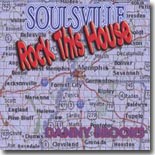 The music of
Danny Brooks is an extension of his self-acknowledged
mentors Hank Williams, Solomon Burke, Otis Redding, Taj Mahal, Blind
Boys of Alabama, and John Lee Hooker. In fact, any of these
foot-stomping, hand-clapping, Stax/Muscle Shoals-rooted songs could have
easily been hits for any of those legends. Brooks is a Canadian singer,
songwriter, guitarist, harmonicist who Brownie McGhee once complemented
by saying, “Son fo' a white boy, you sho' nuff gotta suntan on the
inside.”
The music of
Danny Brooks is an extension of his self-acknowledged
mentors Hank Williams, Solomon Burke, Otis Redding, Taj Mahal, Blind
Boys of Alabama, and John Lee Hooker. In fact, any of these
foot-stomping, hand-clapping, Stax/Muscle Shoals-rooted songs could have
easily been hits for any of those legends. Brooks is a Canadian singer,
songwriter, guitarist, harmonicist who Brownie McGhee once complemented
by saying, “Son fo' a white boy, you sho' nuff gotta suntan on the
inside.”
The sound of Memphis soul comes alive throughout Brooks' 55-minute
disc, Soulsville - Rock This House (HIS House). What are its 13 original songs about? Like a loving and caring
parent, Brooks, a former substance abuser, doesn’t want his listeners to
make the same mistakes as he has made. The songs bear inspirational
lyrics and some are solidly rooted in Christian theology. As example,
the title track is a proclamation of Brooks’ faith and what it has done
for him. The man simply wants to testify about what he has found.
Perhaps due to Brooks’ own life experiences, the songs have a common
theme about losing everything and then finding everything. The best
illustration of this can be found on the beautiful ballad "You’ll Find A
Way." Lyrically, the rootsy "Can’t Keep A Good Man Down For Long" is
similar to George Harrison’s "Horse To The Water." Brooks’ song features a
catchy beat, rock ‘n’ soul rhythm, surging keyboards, soulful lead
vocals, and the authoritative backing vocals of Amoy Levy.
I strongly
believe Brooks has a hit on his hands with "Good Love Is Hard To Find."
The rhythm is moving and the lyrics hit home. The song reveals something
we all know deep inside but seldom that time to recognize. When good
music and thought-provoking lyrics come together to create a jubilant
song, it can move you to tears. This is one of those songs.
No single instrument or solo stands out on this second installment
in Brooks’ Soulsville Trilogy. It’s the songs, which at times create a
revival atmosphere, and their messages that you’ll remember. Like Souled
Out ‘n Sanctified, Rock This House was produced by Richard Bell,
features The Rockin’ Revelators (an amazing group of 15 musicians and
vocalists) as Danny’s backing band, and contains a multi-page liner
booklet with photos and song lyrics.
The biggest difference is the
addition of a punchy horn section. Unlike Delbert McClinton, Brooks’
vocals aren’t consistently gruff and soulful. At times, they wheeze yet
they are always intense. Some listeners may shy away or even get turned
off by some lyrics that reveal a deeply convicted man, e.g., "Down On My
Knees." Yet, after listening to this CD, you realize you don’t have to
face life’s challenges alone. On Rock This House Danny Brooks is all
about being part of a solution instead of a problem.
--- Tim Holek
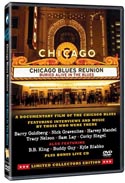 Buried Alive In The Blues (Out The Box Records) is a celebration
of the first generation of white musicians who openly embraced the
blues. They were accepted and included to the point of performing with
their black heroes and establishing the first integrated blues band. The
generation is now approaching or has already entered their senior years.
Like your favorite grandparents, they have a valuable history that
deserves to be told and heard.
Buried Alive In The Blues (Out The Box Records) is a celebration
of the first generation of white musicians who openly embraced the
blues. They were accepted and included to the point of performing with
their black heroes and establishing the first integrated blues band. The
generation is now approaching or has already entered their senior years.
Like your favorite grandparents, they have a valuable history that
deserves to be told and heard.
Chicago Blues Reunion’s members have led interconnected
professional lives for the past five decades. Nick Gravenites
(vocals/guitar) wrote "Buried Alive In The Blues" for Janis Joplin and
"Born In Chicago" – the signature song of The Paul Butterfield Blues
Band featuring Sam Lay (vocals/drums). Butterfield’s guitarist, Mike
Bloomfield, later joined The Electric Flag, which included Barry
Goldberg (keyboards) and Gravenites. Tracy Nelson (vocals) was a fixture
on Chicago’s 1960s folk and blues scenes before she founded Mother
Earth. Harvey Mandel (guitar), a Bloomfield protégé, was part of Canned
Heat and John Mayall’s Bluesbreakers. Corky Siegel (harmonica/vocals)
has been a Chicago fixture from his years with Siegel-Schwall. Joining
them are Gary Mallabar (drums), Rick Reed (bass), and Zach Wagner
(guitar).
Appearing aged and not well preserved, Gravenites states, “We have a
history,” while the youthful looking, gray-haired Siegel adds, “We are
part of each other’s lives.” In a nutshell, they took black blues out of
the black Chicago clubs and introduced it to the world beginning in the
city’s North Side. This stylishly packaged DVD/CD combo includes a
bountiful 32-page booklet loaded with archival photos. The 80-minute DVD
presents six live performances (these plus eight more are included on
the hour-long CD), but it also exposes interviews with band members, and
Buddy Guy, as well as archival video, and a photo gallery with many
never before seen photographs. Especially cherishing is the footage of
Electric Flag at Newport and film clips from an early ’70s Soundstage
PBS TV show featuring Muddy Waters, Junior Wells, and Gravenites. The
praise-filled interviews have been visually edited to have a retro look.
Overall, the DVD unfolds like a well-written special feature in your
favorite blues magazine.
Recorded in stereo on October 15, 2004, at FitzGerald’s in Berwyn,
Illinois, Gravenites performs while seated throughout. On "Born In
Chicago" Mandel’s guitar screeches as it is yanked in the background.
The title track contains a relaxed groove that is welcoming and
familiar. At times, as on this song, the tiny stage makes it a challenge
for the camera operators to maintain a non-obstructed view.
"Walk Away" exhibits the warbling vibrato vocals of Nelson. During the
song, you can tell Siegel loves the performance. This image echoes his
interview exclamation, “We love the blues.” The deepest blues emerges on
"Left Handed Soul." Here, the electric piano is audacious, while the
organ is haunting.
The keyboards punch out and make Slim Harpo’s "Miss You Like The Devil"
a rock’n shuffle while Nelson’s vocals command enthusiasm. "Drinkin’
Wine" is an outright fun song that jumps and rocks at the same time.
Delbert McClinton’s "I Need All The Help I Can Get" contains the best
rhythm and a dose of funk.
"Death Of Muddy Waters" is traditional electric blues performed in honor
of its ultimate purveyor. Mandel’s wicked guitar is showcased on "Snake"
while Lay kicks out incomparable vocals on a medley of classic rock ‘n’
roll. Additionally, you’ll hear boogie rock and psychedelic blues-rock.
Gravenites’ vocals aren’t strong; Mandel’s heavy guitar is outlandish,
while Goldberg’s keys are scintillating.
The title of the virtuous group is a bit misleading since Muddy Waters,
Howlin’ Wolf, Lil’ Ed, and Carl Weathersby are golden era and modern day
artists that come to mind when you think of Chicago Blues. It is
doubtful the artists who comprise this super group would land near the
top of an exhaustive Chicago Blues listing.
The fact remains; they were actively part of the Chicago Blues scene and
were mentored by its golden era prophets. After watching the DVD, you
walk away with nothing but respect and admiration for these artists.
They achieved what no one had done before them and, thankfully, some of
them have persevered so a new generation can enjoy them and hear their
worthy story.
--- Tim Holek
 JW-Jones believes in living life to the fullest. This comes
across in the delightful music on his fourth CD, Kissing In 29
Days (NorthernBlues), which can best be described as ’30s/’40s big
band swing meets ’50s rock ‘n’ roll. “I hope people hear that I am
taking music from that great era, and that I’m breathing new life into
it,” explains Jones. Listening to Kissing in 29 Days will transport you
to another time while keeping a portion of you in the present. The 14
songs – including three covers – are primarily about love and
relationships. Throughout, you’ll hear jumping, jazzy blues, jitterbug
jaunts, cool instrumentals, and blues shuffles.
JW-Jones believes in living life to the fullest. This comes
across in the delightful music on his fourth CD, Kissing In 29
Days (NorthernBlues), which can best be described as ’30s/’40s big
band swing meets ’50s rock ‘n’ roll. “I hope people hear that I am
taking music from that great era, and that I’m breathing new life into
it,” explains Jones. Listening to Kissing in 29 Days will transport you
to another time while keeping a portion of you in the present. The 14
songs – including three covers – are primarily about love and
relationships. Throughout, you’ll hear jumping, jazzy blues, jitterbug
jaunts, cool instrumentals, and blues shuffles.
The featured instruments are Jones’ expansive guitar and Brian James’
tooting tenor saxophone. Each of these two 20 somethings interplay with
each other as if they’ve been performing together for 20 years. It’s
bewildering to learn they have been together for less than five years
and Jones has only been playing guitar for a little more than ten years.
Although his guitar talent is superior, Jones also handles lead vocals.
The long standing NorthernBlues artist has matured the most among the
label’s roster. No wonder he is getting excellent and respected guests
to appear on his discs. This time, it’s the distinguished sax player
David “Fathead” Newman who guests on three songs. The celebrated Texan
is well known for his multi-year association with Ray Charles. There was
no better choice than Newman to guest on Charles’ "Hallelujah I Love Her
So." Though it’s repetitive, Little Milton’s "Hey Girl!" contains a
catchy groove
and lively horns which incite dancing. "Got Me Chasin’" exposes Frank
Scanga’s skillful harp, which does not shriek.
His youthful looks may cause some to dismiss or refute him, but make no
mistake – this man is musically mature for his age. The self-produced
disc contains a rich sound that accentuates the full horn section,
drums, and guitar. JW-Jones has the guitar flair of swing masters from
the past and a group of supporting musicians, who are developing into a
world class band. Jones’ core group is comprised of Nathan Morris
(bass), Artie Makris (drums), and Geoff Daye (keyboards). The six-member
Wind-Chill Factor Horns are a definite highlight.
Young Jay-Dub is an earnest contender for this sub-genre’s crown. All he
needs is an urbane vocalist to elevate him and enrich his music to a
higher level.
--- Tim Holek